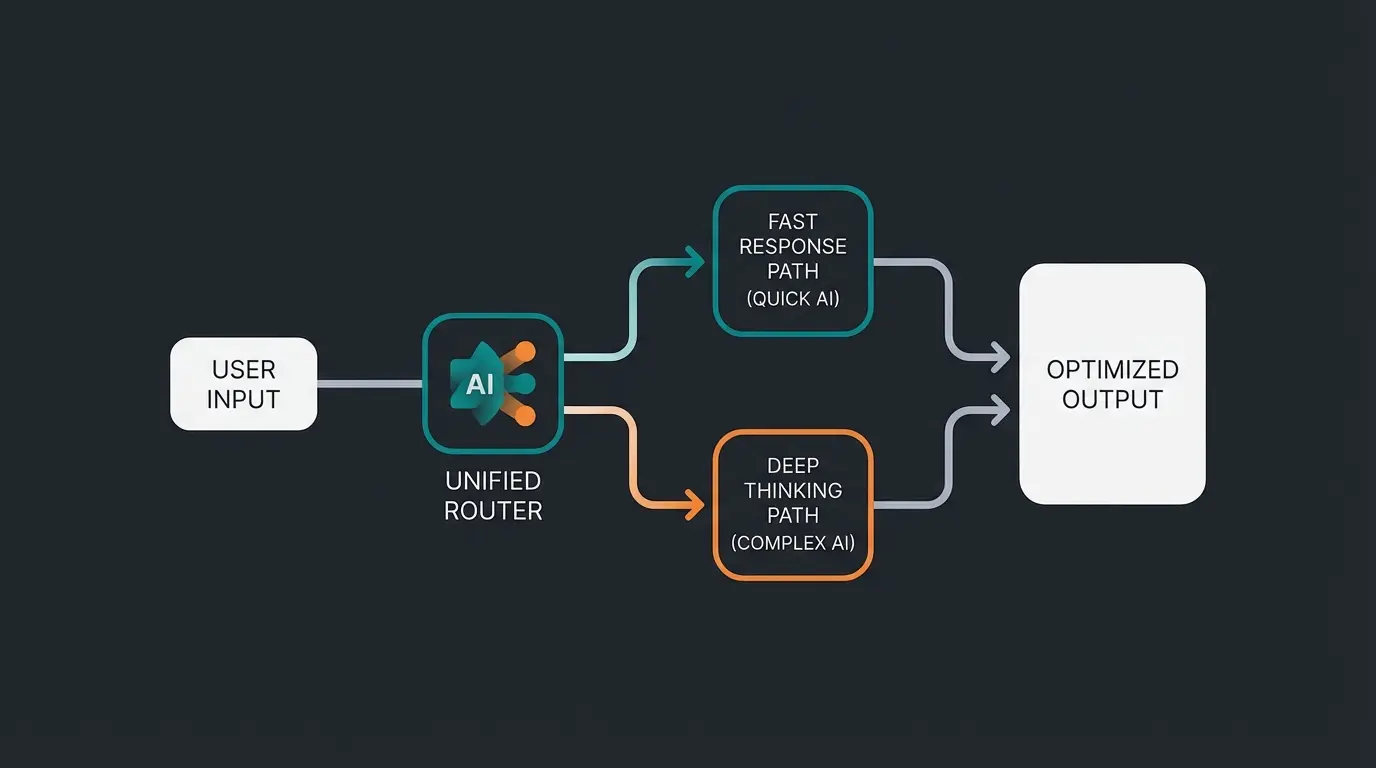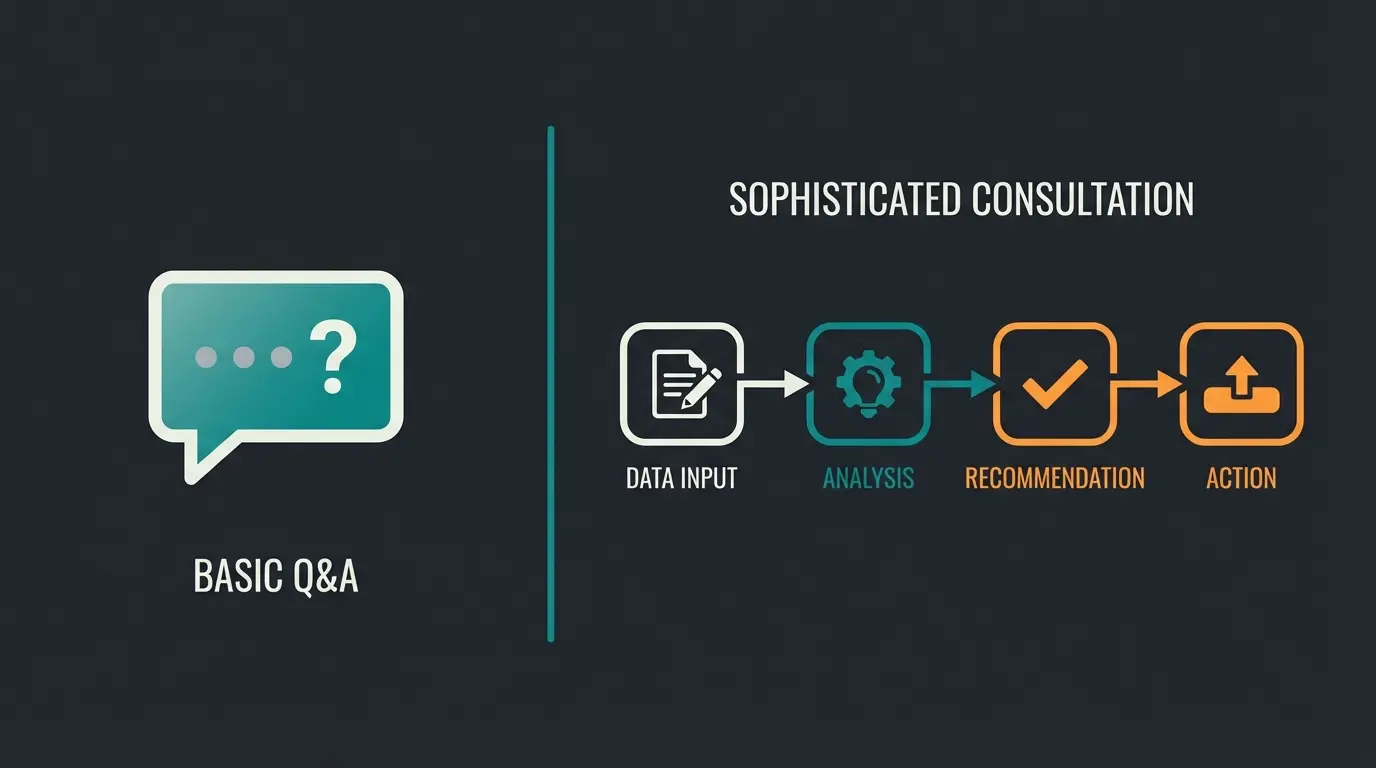The Era of AI Consultants Has Arrived
The development of artificial intelligence is progressing at a breathtaking pace. Just as we had grown accustomed to the capabilities of GPT-4, the next generation has already arrived. GPT-5, released on August 7, 2025, represents more than an incremental improvement—it marks the transition from AI as a search tool to AI as a genuine digital consultant.
What sets this new AI model apart? What improvements and new features does it bring? And most importantly, how can businesses leverage GPT-5 for true product consultation rather than simple customer support? In this comprehensive article, we examine everything you need to know about GPT-5 and why it represents a fundamental shift in how businesses can deploy artificial intelligence.
The key insight that most tech coverage misses is this: GPT-5 isn't just faster or smarter—its reasoning capabilities finally enable what businesses have long sought: an AI that can genuinely sell, not just tell.
What We Know About GPT-5: The Hard Facts
Unlike the speculation that preceded its launch, we now have concrete data about GPT-5's capabilities. OpenAI has delivered on many of its promises, with some features exceeding expectations:
- GPT-5 was officially released on August 7, 2025, following extensive safety testing
- The context window has expanded dramatically to 400,000 tokens
- The revolutionary Unified Router architecture automatically switches between fast and thinking models
- Benchmark performance exceeds both GPT-4 and the o3 reasoning model
- Multimodal capabilities including advanced speech and image processing have been significantly enhanced
- Hallucination rates have been reduced by approximately 60% compared to GPT-4
- Enterprise-grade data privacy options are available for GDPR compliance
These aren't speculative predictions—they represent the reality of what businesses can deploy today. The most significant advancement, however, lies not in raw performance metrics but in the fundamental architecture change that enables true consultative interactions.

The Unified Router: Adaptive Intelligence Explained
The most transformative feature of GPT-5 is its Unified Router architecture. Rather than treating this as merely a technical specification, understanding the Router is essential to grasping why GPT-5 finally enables true product consultation.
The Unified Router works as adaptive intelligence that automatically determines the optimal processing path for each query. Simple greetings and straightforward questions are handled by the fast model (GPT-5-Mini), delivering responses with minimal latency. Complex product matching, nuanced recommendations, and multi-step reasoning are automatically routed to the Thinking Model, which takes additional processing time to deliver genuinely reasoned responses.
Customer asks a question about product needs or requirements
System evaluates query complexity in milliseconds
Greetings and basic questions handled instantly by GPT-5-Mini
Product matching and recommendations processed by reasoning model
Tailored recommendation with explained reasoning delivered
This isn't merely about speed optimization. The Router represents the first AI architecture specifically designed to replicate the workflow of a human sales consultant: quick acknowledgment, thoughtful analysis, and reasoned recommendation.
The Thinking Difference: GPT-5 vs. GPT-4
A central aspect that OpenAI addressed with GPT-5 is the improvement of general intelligence and logical reasoning capability. As Sam Altman previously stated: "Perhaps the most important area of progress will be the ability for logical reasoning. At the moment, GPT-4 can only reason in very limited ways."
The shift from GPT-4 to GPT-5 represents a fundamental change in how the AI processes information—from "predicting the next word" to "reasoning through a problem." This distinction is crucial for understanding why GPT-5 can serve as a product consultant rather than merely an information retrieval system.
| Capability | GPT-4 Chatbot | GPT-5 Product Consultant |
|---|---|---|
| Primary Goal | Answer Questions | Solve Problems and Guide Decisions |
| Context Memory | Short-term (128k tokens) | Long-Context Reasoning (400k tokens) |
| Interaction Style | Passive (waits for prompts) | Proactive (asks clarifying questions) |
| Accuracy | Prone to hallucination | Safe Completions with fact-checking |
| Response Type | Generic information | Personalized recommendations with reasoning |
Consider a practical example: When a customer states "I need a laptop," GPT-4 would respond by listing specifications and popular models. GPT-5, however, engages in consultative dialogue—asking about intended usage, budget constraints, portability requirements, and specific software needs before delivering a tailored recommendation that explains why each suggestion fits the stated criteria.
Improved Intelligence and Logical Thinking
Specifically, GPT-5 demonstrates significantly enhanced abilities to:
- Understand complex relationships and interdependencies
- Draw logical conclusions from incomplete information
- Solve problems in a structured, step-by-step manner
- Capture the user's intention with greater precision
- Filter and connect relevant information across long contexts
- Explain its reasoning process transparently
These improved cognitive capabilities enormously expand potential applications. GPT-5 has become an even more powerful assistant for demanding tasks in areas such as research, analysis, strategy development, and—most importantly for businesses—product consultation and sales support.
Higher Reliability and Consistency
Another critical focus in GPT-5's development was increasing reliability. Altman previously explained: "If you ask GPT-4 most questions 10,000 times, one of those 10,000 is probably pretty good, but it doesn't always know which one, and you want the best answer out of 10,000 every time. That's why this increase in reliability will be important."
GPT-5 now delivers on this promise:
- Consistently high-quality responses across repeated queries
- Significantly reduced errors and hallucinations (approximately 60% reduction)
- Better self-assessment of response reliability
- Transparent communication when facing uncertainty
- Safe Completions feature that fact-checks before responding
This increased reliability makes GPT-5 significantly more attractive for professional applications. Users can rely more heavily on outputs without constantly needing to verify everything—a critical requirement for product consultation where incorrect recommendations damage customer trust.

Why GPT-5 Is the Consultant We've Been Waiting For
Most businesses have been using AI as a "search bar" or FAQ bot—a tool that retrieves information but doesn't guide decisions. GPT-5's reasoning capabilities fundamentally change this paradigm, finally enabling what can genuinely be called digital product consultation.
The Gap: Why Old Bots Failed at Sales
Traditional AI chatbots, including those powered by GPT-4, failed at consultative selling for several critical reasons:
- High hallucination rates undermined trust in recommendations
- Lack of contextual understanding led to generic, unhelpful responses
- Inability to ask clarifying questions meant poor needs assessment
- Short context windows prevented understanding of complex product catalogs
- Passive interaction style waited for users rather than guiding them
The Solution: Multi-Step Workflow Planning
GPT-5's ability to plan and execute multi-step workflows transforms it from information retrieval to genuine consultation. The AI can now:
- Recognize incomplete information and ask targeted clarifying questions
- Analyze responses against complex product catalogs with thousands of items
- Consider multiple factors simultaneously (budget, preferences, use case, constraints)
- Deliver tailored recommendations with explicit reasoning
- Adapt its communication style to match customer preferences
This represents the difference between an AI that tells you about products and one that genuinely helps you choose the right one.
Practical Use Case: The Adaptive Sales Assistant
To understand how GPT-5 functions as a product consultant, consider this real-world scenario:
A customer visits an online electronics retailer and types: "I need something for video calls." This vague query would stump traditional chatbots, which might return hundreds of products ranging from webcams to complete video conferencing systems.
Instantly acknowledges the request and asks clarifying questions about usage frequency, environment, and budget
Proactively inquires about specific needs: home office vs. conference room, number of participants, existing equipment
Analyzes responses against product catalog, considering compatibility, value, and customer priorities
Delivers 2-3 tailored options with explicit reasoning: "I recommend X because you mentioned Y and need Z"
The key difference is in the final output. Rather than listing products, GPT-5 delivers a response like: "Based on your work-from-home setup with frequent client calls, I recommend the Logitech Brio 500 because it offers excellent low-light performance for your north-facing office, includes a privacy shutter you mentioned wanting, and falls within your €150 budget. If you anticipate needing higher resolution for presentations, the Elgato Facecam would be worth the additional €80."
This is consultation, not search.
Discover how GPT-5-powered product consultation can increase conversion rates and customer satisfaction for your business.
Start Your Free TrialExtended Multimodal Capabilities
Multimodality—the ability to process different input and output formats—plays an even greater role in GPT-5. The released capabilities include:
- Improved image and video analysis for visual product queries
- Advanced speech recognition and natural voice output
- More natural conversations that consider tone and context
- Enhanced understanding of visual product materials and specifications
- Integration capabilities with video content similar to the Sora model
These multimodal capabilities elevate human-AI interaction to a new level. GPT-5 can serve as an even more versatile assistant for all manner of tasks, from analyzing product images customers share to providing voice-based consultation.
Larger Context Window
A central technical improvement in GPT-5 is the expansion of the context window. While GPT-4 worked with 128,000 tokens, GPT-5 has made the leap to 400,000 tokens—comparable to Google's Gemini model that pioneered million-token contexts.
A significantly larger context window enables GPT-5 to:
- Process longer texts and documents in their entirety
- Consider more context when formulating responses
- Maintain consistency over longer conversations
- Handle complex tasks in a single session
- Remember earlier parts of extended consultation sessions
- Analyze complete product catalogs rather than fragments
For enterprise applications with large data volumes, this represents an enormous advancement. Product consultants can now access entire catalogs, customer histories, and specification databases within a single context.
Increased Adaptability
Another trend that has continued with GPT-5 is improved adaptability. Sam Altman had emphasized the importance of personalization: "People want very different things from GPT-4: different styles, different assumptions."
With GPT-5, we now have:
- More options for adjusting style and personality
- Better understanding of individual user preferences
- More flexible deployment options for different tasks and industries
- Improved handling of formal versus informal communication
- Enhanced adaptation to regional communication norms
This increased adaptability makes GPT-5 an even more versatile tool for widely varying use cases, from casual consumer interactions to formal B2B consultations.

Implementation in Germany and the DACH Region
For German businesses considering GPT-5 deployment, several critical factors deserve attention:
GDPR and Data Privacy Compliance
OpenAI has responded to European regulatory requirements with enterprise-grade data handling options. Private instances ensure that customer data processed through GPT-5 consultations remains within compliant infrastructure. This addresses a key concern that previously limited AI deployment for customer-facing applications in Germany.
The EU AI Act, now fully applicable, classifies product recommendation systems as limited risk, requiring transparency but not prohibiting deployment. Businesses must ensure customers know they're interacting with AI—a requirement easily met through appropriate disclosure.
German Language Nuance
GPT-5 has demonstrated significant improvements in handling German language subtleties compared to GPT-4. The formal "Sie" versus informal "Du" distinction is now handled with greater contextual awareness, and regional dialect understanding has improved substantially. For businesses serving the DACH region, this means more natural customer interactions without the awkward formality mismatches that plagued earlier models.
Tokens available for processing, 3x larger than GPT-4
Compared to GPT-4, improving recommendation reliability
General availability across enterprise tiers
On complex problem-solving benchmarks vs. GPT-4
Pricing and Access Tiers
GPT-5's pricing structure follows OpenAI's established model but with important distinctions for enterprise users:
- Free tier: Limited GPT-5 access with usage caps, suitable for evaluation
- Plus tier ($20/month): Full GPT-5 access for individual professionals
- Pro tier ($200/month): Priority access, extended context, advanced features
- Enterprise: Custom pricing with private instances, GDPR compliance, and dedicated support
For businesses deploying GPT-5 as a product consultation system, the Enterprise tier provides necessary compliance features and SLA guarantees. The API pricing for GPT-5 reflects its advanced capabilities, with costs approximately 40% higher than GPT-4 for equivalent usage.
Notably, GPT-4 has now become more accessible, with many features previously reserved for paid tiers now available to free users—a pattern that suggests GPT-5 features will similarly democratize over time.
Training Data and Ethical Considerations
A sensitive topic in GPT-5's development has been the training data used. OpenAI utilizes publicly available information from the internet, which has led to legal challenges:
- The New York Times sued OpenAI over unauthorized use of copyrighted content
- Other news agencies have initiated legal proceedings
- Concerns about EU data protection regulation compliance have been raised
OpenAI has responded by implementing content licensing agreements with major publishers and developing more transparent training data documentation. For enterprise users, this provides greater clarity about the provenance of the AI's knowledge base.
Competition and the AI Ecosystem
GPT-5 enters an increasingly competitive AI ecosystem. Beyond OpenAI, other tech giants are working on advanced language models:
- Google with Gemini 3, now directly competing for enterprise consultation use cases
- Anthropic with Claude 3 (Opus, Sonnet, and Haiku variants)
- Meta with LLaMA 3 and its open-source approach
- Microsoft with Azure AI integrations leveraging OpenAI technology
This competition continues to accelerate innovation. For users, it means a greater selection of powerful AI tools for different use cases. For businesses evaluating consultation platforms, the key differentiator remains GPT-5's Unified Router architecture, which specifically enables the adaptive consultation workflow that competitors have yet to match.
The Future of ChatGPT and AI Colleagues
With GPT-5, OpenAI has taken another step toward human-like AI colleagues. Brad Lightcap, COO of OpenAI, suggested: "Will there still be such a thing as a prompter in 2026? You don't make your friend your prompter."
The vision is an AI colleague that:
- Communicates more naturally and human-like
- Proactively takes on tasks and makes suggestions
- Adapts to individual needs and preferences
- Provides supportive assistance across many areas of life
GPT-5 has taken a significant step in this direction, even if the complete vision will likely only become reality in later generations. The progression from GPT-4 to GPT-5 suggests that by 2027, we may see AI systems capable of managing entire customer relationships rather than individual interactions.
Future Outlook: GPT-5.2 and Beyond
As of December 2025, rumors of GPT-5.2 are circulating within the AI community. Reports suggest OpenAI is operating under "Code Red" conditions to respond to competitive pressure from Gemini 3's strong market reception. Expected improvements include:
- Enhanced real-time processing capabilities
- Improved integration with external tools and databases
- Further hallucination reduction targeting 80% improvement over GPT-4
- Extended multilingual consultation capabilities
- Advanced personalization based on interaction history
The message for businesses is clear: Don't wait for GPT-6. The era of the AI consultant has arrived with GPT-5, and early adopters are already gaining competitive advantages in customer experience and conversion rates.
Challenges and Risks
Despite all the fascinating possibilities of GPT-5, there are challenges and potential risks to consider:
- Data privacy and security: How are sensitive user data protected during consultations?
- Bias and fairness: How can prejudices in recommendations be minimized?
- Misuse: How can deployment for harmful purposes be prevented?
- Job displacement: What effects does GPT-5 have on sales and consulting roles?
- Dependency: Is there a danger of over-reliance on AI systems for critical decisions?
OpenAI and other AI companies must address these questions to ensure responsible development and use of GPT-5. For businesses, implementing appropriate human oversight for high-stakes recommendations remains essential.
Conclusion: GPT-5 as a Milestone in AI Evolution
The release of GPT-5 marks another milestone in the rapid evolution of AI language models. With improved cognitive capabilities, higher reliability, extended multimodal features, and increased adaptability, GPT-5 delivers the significant performance leap that was promised.
More importantly, the Unified Router architecture and Thinking Model capabilities enable a fundamental shift in how businesses can deploy AI: from passive information retrieval to active product consultation. This is the breakthrough that transforms AI from a support tool into a sales asset.
One thing is certain: With GPT-5, the interaction between humans and AI has been elevated to a new level. We stand at the threshold of an era in which AI assistants become increasingly trusted and capable companions in our daily lives and work. The businesses that embrace this shift—deploying AI consultants rather than chatbots—will define the customer experience standard for years to come.
Frequently Asked Questions About GPT-5
GPT-5 was officially released on August 7, 2025. It is fully available in Germany and the DACH region across all subscription tiers, including enterprise options with GDPR-compliant private instances for businesses requiring enhanced data privacy.
The Unified Router is GPT-5's core architectural innovation that automatically routes queries to either the fast model (for simple responses) or the Thinking Model (for complex reasoning). This enables adaptive consultation where simple acknowledgments happen instantly while product recommendations receive deeper analysis—mimicking how human consultants work.
GPT-5 offers a 400k token context window (vs. 128k for GPT-4), approximately 60% fewer hallucinations, and genuine reasoning capabilities. For business applications, this means GPT-5 can serve as a product consultant rather than just an FAQ bot, guiding customers through purchase decisions with explained reasoning.
Enterprise pricing is custom-negotiated based on usage volume and requirements. Standard tiers include Free (limited access), Plus ($20/month), and Pro ($200/month). Enterprise deployments include private instances, GDPR compliance features, dedicated support, and SLA guarantees essential for customer-facing applications.
GPT-5's reduced hallucination rates and Safe Completions feature make it significantly more reliable for product recommendations than previous models. However, best practice for enterprise deployment recommends human oversight for high-value decisions and clear disclosure to customers that they're interacting with AI assistance.
Join forward-thinking businesses using GPT-5 to transform customer experience. Our platform makes enterprise AI consultation implementation seamless and compliant.
Get Started Today